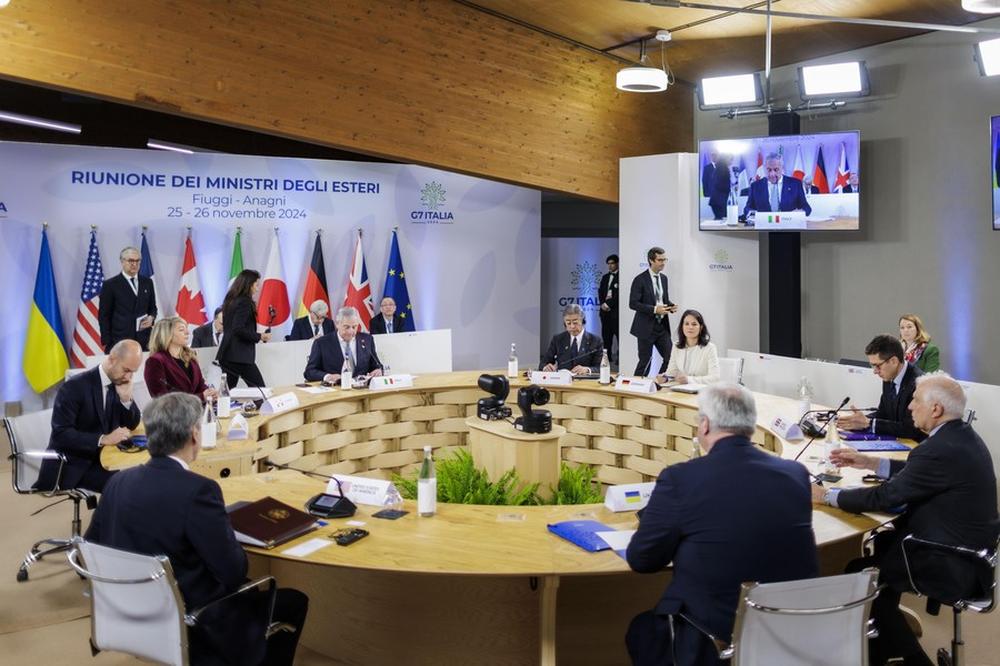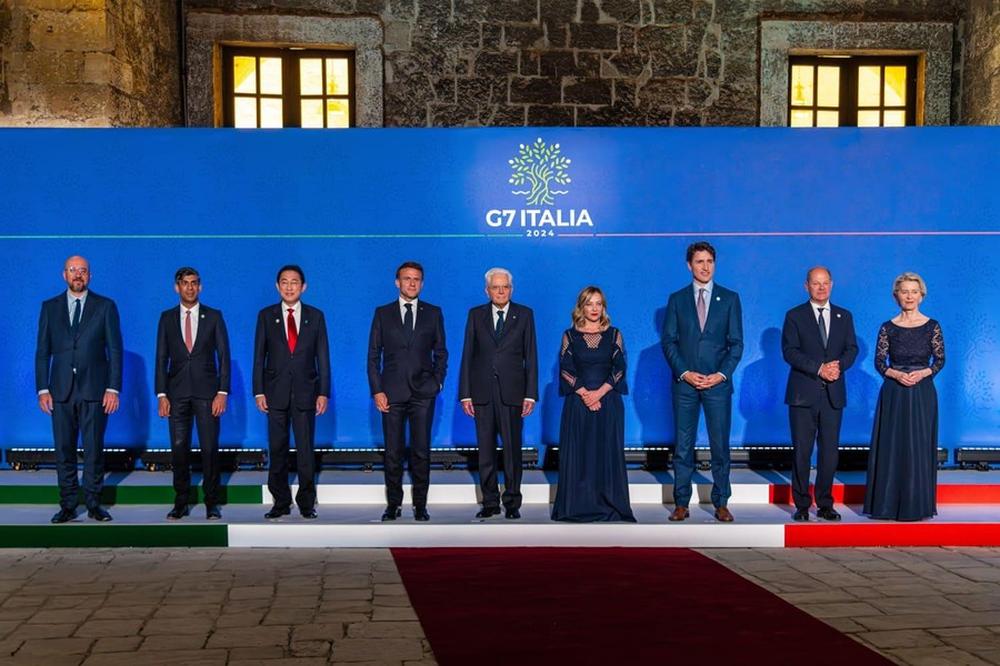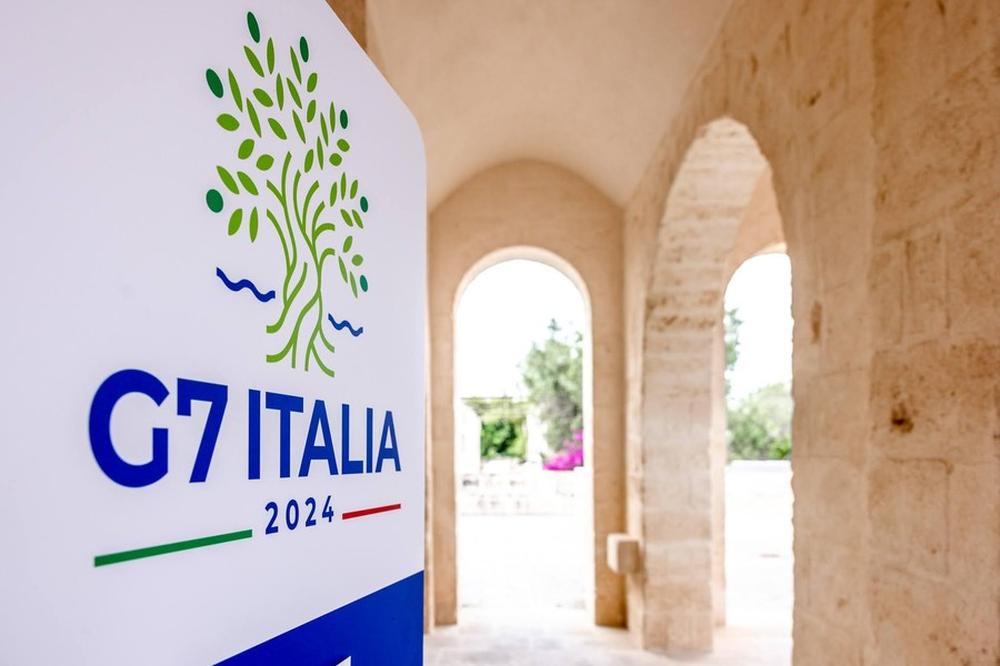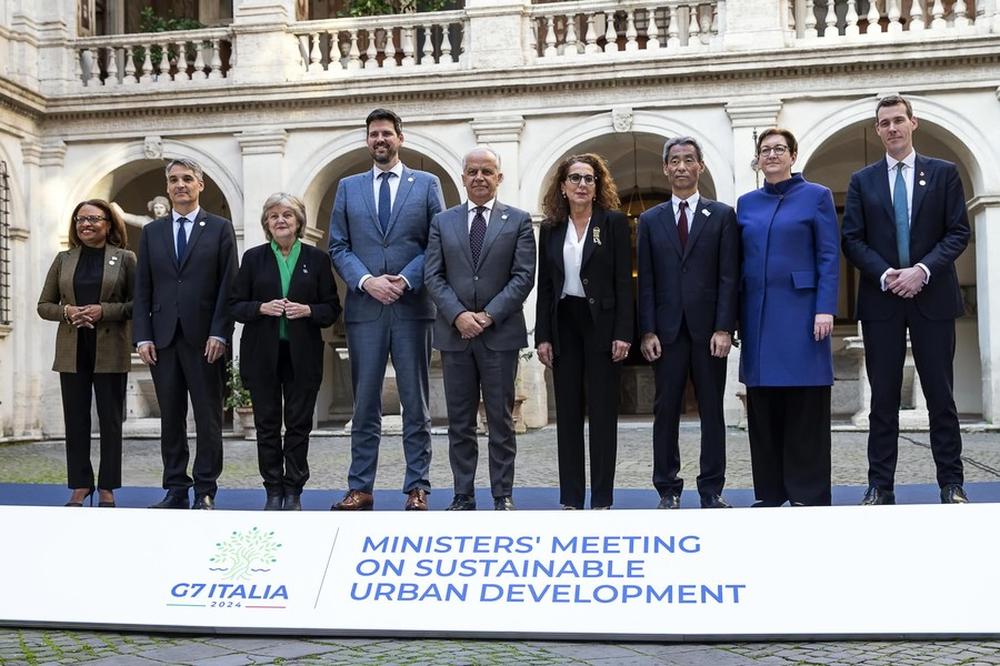
- #Economy & Trade
- #Europe
- #Global Issues

-
Expanded G7 as a Diplomatic Framework: The article argues for an expanded G7 framework to address Europe’s economic security challenges, including supply chain resilience, technology transfer, and anti-coercion measures. Potential new members like Australia, Korea, the Netherlands, and Poland could bring strategic weight and align with European priorities.
-
Technology Transfer Reform and Anti-Coercion Strategies: Europe’s current mechanisms, such as the Wassenaar Arrangement, are inadequate to curb technology acquisition by hostile states like Russia and China. A more assertive and cohesive diplomatic approach is necessary to align export controls and counter economic coercion effectively.
-
Supply Chain Resilience and Forward-Looking Policy: Strengthening supply chain resilience through diplomatic collaboration and fostering technology alliances are critical. Friendshoring and broader cooperation beyond the G7, involving both democratic and strategic non-democratic states, are essential to counter BRICS’ growing influence.
The new European Commission had identified economic security as a “central priority” for 2024-2029. What diplomatic cooperation formats can best advance this European agenda? The EU needs a diplomatic framework that aligns with European interests in policy areas related to technology and industrial matters, both from a defensive and an offensive angle. This is a matter of efficiency for Europe’s economic security instruments. In particular, the EU needs greater policy alignment in four critical areas: managing technology transfers, especially towards Russia and China; supporting the private sector’s efforts to mitigate supply chain disruptions and enhance resilience; Forming coalitions against economic coercion, enabling the EU to respond swiftly and decisively to future crises; and advancing a forward-looking technology alliance agenda to strengthen Europe’s innovation capacity, and its industrialization in Europe. An expanded G7 is an attractive idea from that perspective for the EU, the 8th member of the G7 since the early 1980s, alongside France, Germany and Italy.
The Role of the G7 in Economic Security
The G7, established in 1975 in response to the oil shock, has its roots firmly tied to economic security challenges and the ambition to coordinate policy responses in this domain. While its agenda has since expanded to encompass a broad range of international issues, the G7 has recently sharpened its focus on economic security. Under Japan's presidency in 2023, it emerged as the primary diplomatic platform for aligning policies in this critical area. This effort culminated in the May 2023 G7 Leaders’ Statement on Economic Resilience and Economic Security, which pledged to "enhance our ongoing strategic coordination on economic resilience and economic security by reducing vulnerabilities and countering malign practices that exploit and reinforce them."
The Italian presidency in 2024 reaffirmed this priority, placing greater emphasis on combating "harmful market distortions and global excess capacity in key sectors resulting from non-market policies and practices." These developments underscore the G7’s evolving role as a cornerstone for addressing shared economic security concerns among its members and participants.
However, given the magnitude of the challenges facing Europe and its allies, a more inclusive and expanded framework may be necessary if more effective and sustainable results are to be achieved.
Supply Chain Resilience: supporting private sector initiatives
In the sphere of supply chain resilience, the private sector plays the pivotal role in managing risks and mitigating vulnerabilities to geopolitical disruptions. However, these efforts can be significantly bolstered by a strong diplomatic framework that promotes friendshoring and facilitates effective information sharing among like-minded nations. The uncertain future of the Indo-Pacific Economic Framework (IPEF), after the second Trump administration assumes office, raises concerns about the potential collapse of the only existing plurilateral platform for supply chain information sharing.
The EU's earlier reluctance to join IPEF, driven by skepticism about its long-term viability, may prove right if this happens. But there is a critical gap to be filled in international cooperation on supply chain resilience. An expanded G7 could address this vacuum by developing dedicated mechanisms for supply chain coordination and information exchange if countries playing a key role in critical supply chains are involved.
Technology Transfer: Moving Beyond Wassenaar
The EU and its Member States have an interest in reforming the current technology transfer regime, which remains largely defined by the Wassenaar Arrangement. While transforming the regime is not an official European policy, it is clear that the existing regime is insufficient to address the security challenges linked to technology acquisition by hostile states. The EU has proposed a “Wassenaar minus one” strategy—allowing updates to European export control lists with consensus from all members except Russia— but this approach fails to address two critical challenges for Europe:
1. The sanctions against Russia have not effectively weakened its arms industry, partly due to clandestine diversion channels established by Russia in third countries. Europe requires a more assertive technology transfer policy aimed at enhancing compliance and export controls among countries where Russia actively sources technology.
2. Growing pressure from the United States for stricter technology denial measures against China is expected to intensify. If the EU aligns with the policy direction championed by European Commission President Ursula von der Leyen, advocating for restrictions on dual-use technologies that could enhance China’s military capabilities, a cohesive diplomatic strategy beyond bilateral transatlantic relations will be in the interest of Europe.
Anti-Coercion: The Need for a Broader Coalition
If a coercion crisis were to directly impact an EU Member State, a specific sector, or a company in Europe, the EU’s anti-coercion instrument would likely be inadequate for a swift and effective response. In such scenarios, mobilizing a broader coalition beyond the G7 would serve Europe’s strategic interests better. The G7 has already played a role in creating a unified stance against economic coercion among its participants, and an expanded G7 would prolong that approach.
The Case for a Proactive Economic Foreign Policy
Beyond a defensive stance, the EU should embrace a more assertive economic foreign policy that pursues technology alliances wherever feasible. Given the sensitivities around technology sharing and the need for concrete projects, bilateral agreements may often be the most practical route. However, a plurilateral framework would be advantageous for identifying broader opportunities and fostering innovation collaboration.
The Right Diplomatic Framework: Key Considerations
Convergence already exists between existing G7 members and countries like Australia, Korea, the Netherlands and Poland, who face similar economic security challenges, have already adopted policies that align with the G7 agenda, and even if they operate within the framework of the G7 in the case of Poland and the Netherlands, carry particular strategic weight in current economic security matters.
In evaluating how much the G7 should expand from the perspective of European economic security interests, two critical questions arise:
- Should an expanded G7 serve as a counterweight to the expansion of BRICS? This question becomes increasingly salient as BRICS extends its influence, positioning itself as an alternative bloc on the global stage, and attracting countries like Indonesia, Malaysia, Thailand and Vietnam, which play a key role in the restructuring of technology supply chains.
- Should participation be limited to democratic countries? A plurilateral economic security framework may benefit from the involvement of non-democratic states like Vietnam or Singapore.
Some European countries, such as the Netherlands, lean towards a coalition of “technology-holding nations”, those with existing technological strengths. However, Europe must also consider the inclusion of future technology powerhouses, particularly from emerging markets, to build a resilient and forward-looking coalition.
A pragmatic approach to these questions, preserving flexibility for the future, would be to initiate a first phase of expansion targeting Australia, Korea, the Netherlands, and Poland. Bringing these countries into the fold would inject fresh energy into the G7, creating a dynamic that fosters broader interest in joining a reinvigorated platform for policy coordination.
Conclusion
An expanded G7 format, if properly conceived and inclusive of future technology leaders, could be the right platform to meet Europe’s diverse challenges, from supply chain resilience and technology transfer to anti-coercion measures and proactive tech alliances. Under the second Trump administration, it seems unlikely that the United States would spearhead an initiative to expand G7 to new participants. The EU and G7 European members, therefore, are in a good position to lead an effort that would enhance the EU’s economic security agenda.

Mathieu Duchâtel is the Director of the Asia Program at Institut Montaigne, a role he has held since January 2019. Previously, he served as Senior Policy Fellow and Deputy Director of the Asia Program at the European Council on Foreign Relations (ECFR) and as Senior Researcher and Beijing Representative for the Stockholm International Peace Research Institute (SIPRI). He has spent nine years in Shanghai, Taipei, and Beijing, including roles as a Research Fellow at Asia Centre and Visiting Scholar at institutions such as Peking University, the Japan Institute of International Affairs, and the Institute for National Defense and Security Research in Taipei. A political science Ph.D. from Sciences Po, Mathieu has authored numerous publications on Asian geopolitics, technology, and security, including Blue China (2018) and Géopolitique de la Chine (3rd ed., 2022). His research focuses on economic security, technology transfers, and China's strategic developments.


